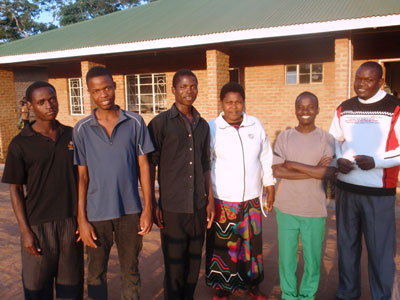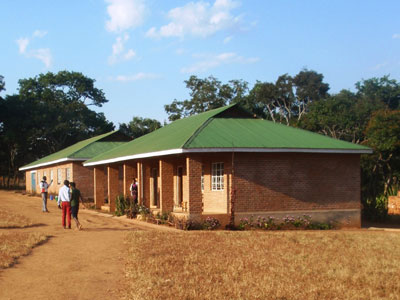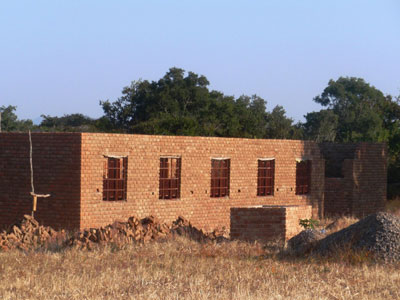A letter from Nancy Collins serving as Regional Liaison for East Central Africa, based in Zambia
November 2016
Write to Nancy Collins
Individuals: Give online to E200471 for Nancy Collins’ sending and support
Congregations: Give to D506149 for Nancy Collins’ sending and support
Churches are asked to send donations through your congregation’s normal receiving site (this is usually your presbytery).
Deaf is not Death.
Our cry to you has been heard.
Disability is not Inability.
Come and see for yourselves.
Today our dream is a reality.
Glory be to God
—Written by a student at Embangweni School for Children with Hearing Disability
(http://embangweni.com/orig_deaf.htm)
Dear Family and Friends,
Many of you know that I worked for 11 years in Egypt before I began serving as Regional Liaison for East Central Africa. Through my work in Egypt—with both Coptic Evangelical Organization for Social Services and the Joining Hands Together for Family Development Network—I learned a great deal about disability, about advocacy, about community-based rehabilitation, and about the ability of children with disability to raise their voices and claim their rights. It was a powerful experience—one I will always treasure, one that helped me to grow in many ways.
So I have been very pleased and touched to learn about the work of the Church of Central Africa Presbyterian (CCAP) in northern Malawi to empower and educate children with disability. Over the years I have visited the three primary schools of CCAP Livingstonia for children with hearing disability—in Embangweni, Karonga and Bandawe. On several visits to Mzuzu, Malawi, I have followed the work being done by the CCAP Livingstonia Education Department to raise awareness of and train teachers and parents about how to best include children with hearing disability in public schools.
In my May 2016 visit to Malawi I revisited Embangweni Primary School for Children with Hearing Disability and saw for the first time the Secondary School for Children with Hearing Disability—opened in March 2015—the only such school in Malawi. That made me wonder about the situation of children with disability in Malawi, and how Malawi compares with Egypt. I did some research, and I learned the following rather alarming facts about the situation of persons with hearing disability in Malawi:
• There are an estimated 200,000 people with hearing disability in Malawi. 98 percent of this population is illiterate and 2 percent have jobs.
• The first school for children with hearing disability was established in Malawi in 1968.
• There are 5,561 primary schools in Malawi, some of which practice inclusion; there are 6 primary schools for children with disability, which serve 861 children.
• It is estimated that 3 percent of children with hearing disability attend school. There are many reasons why disabled children do not attend school: the cost is too high, schools are too far away, the family can’t afford transport, the child is not accepted into a special school, lack of specially trained teachers, the family is ashamed and hides their child, the child is ashamed and afraid of being teased, and just lack of overall accommodations for the special needs of the child.
• There are 451 teachers trained in Special Needs Education; of these 148 serve children with hearing disability.
• In 2009 there were 11 sign language interpreters working in the country, meaning that the deaf community frequently misses out on vital information and crucial services, including information about HIV/AIDs and other health issues.
• Despite the generally good legal environment (Malawi has signed major conventions on rights of persons with disability), the Ministry of Disability and Elderly Affairs (MoDEA) receives only about 0.07 percent of the national budget.
In May 2016 the CCAP Embangweni Secondary School for Children with Hearing Disability had an enrollment of 25 students (21 boys and 4 girls—the girls hostel is under construction) who came from the six primary schools for children with hearing disability as well as some of the regular public schools. Head teacher Benson Mhone and deputy head teacher Josephine Msekawanthu are dedicated, hardworking and caring. Benson was trained in special needs at Montfort College of Special Needs Education and Josephine has a certificate for teachers of the deaf.
Benson says: “I first taught the deaf children at Embangweni Primary School for the Deaf in the year 2002–2003 as an assistant specialist teacher. There was a shortage of specialist teachers. Then I went for upgrading at Domasi College of Education between 2004 and 2006. After qualifying as a secondary school teacher, I was called to train as a specialist teacher to assist the deaf students at Robert Laws Secondary School (in Embangweni). I did the training in 2007 and was posted to the school in 2008, where I had been up to March of 2015 when I was appointed to open this school as head teacher.”
According to Josephine: “I developed the interest of teaching the deaf in 2001 when I had some pupils in my class with hearing problems. I was having challenges to assist them and this prompted me to apply for a course in special needs education so that I could gain skills to teach the pupils with hearing problems. After my studies I was sent to Embangweni Primary School for the Deaf, where I discovered that it is very interesting to interact with people with deafness in class as well as outside the classroom.”
Josephine indicates that “the biggest success (at the secondary school) is that with the insufficient funding from the government, proprietors, and what we get from well-wishers, we are able to keep the students in school. In addition, we have managed to buy one book per subject of which there are not enough.”
According to Benson: “The students have learned a lot. Apart from academic work, they are learning a number of skills that will help them to be self-reliant. They are learning work organization, leadership and social interaction skills that are vital for incorporation into the society. They enjoy most practical subjects. … They are excited to be in an environment where communication is maximized.”
Thanks to God for the ways CCAP works with children with disability. And thanks to God for those American Presbyterians (including the Marion Medical Mission) and those American Episcopalians who have given much out of concern for these children, that they might live in a way that honors their God-given talents. You all are changing lives in important and fundamental ways. Thank you for your concern and generosity.
On another topic, interpretation assignment: I will be back in the U.S.A. and available for speaking in your congregation November 2016 through January 2017, and then again May through September 2017. I am eager to preach, share a minute for mission, speak at a potluck dinner, give a Sunday School presentation for any age, participate in Vacation Bible School, join you for a cup of coffee and conversation—there are many ways I can share the wonders of what God is doing in East Central Africa and in my life. Please email me at nancy.collins@pcusa.org for additional information or to send me an invitation and indicate how you would like me to participate.
Go to https://www.presbyterianmission.org/wp-content/uploads/we-can-help-faqs.pdf for information about hosting a mission co-worker.
Thank you for this opportunity to serve God in this place, at this time. If you have not already made a commitment to this work, please prayerfully consider joining with me and our international partners in ministry in being a part of what our Lord is doing in East Central Africa! I need your prayers and your financial support.
In Christ,
Nancy
Please read this important message from Tony De La Rosa, Interim Executive Director, Presbyterian Church (U.S.A.)
“Do not fear, for I have redeemed you; I have called you by name, you are mine.
When you pass through the waters, I will be with you; and through the rivers, they shall not overwhelm you;
when you walk through fire you shall not be burned, and the flame shall not consume you. (Isaiah 43:1b-2, NRSV)
Dear Friend of the Presbyterian Mission Agency:
Thank you for your prayers and for your financial support of Nancy Collins this year, and any previous year. We hear from our mission co-workers how much your prayerful financial support has meant to them. Please know that you are a vital part of ministries throughout Zambia.
Even as I thank you, I want to let you know that this is a critical time for our congregations and all people of faith to commit themselves to support mission co-workers like Nancy. Our global church partners greatly value her service, and you well know how important this ministry is in building connections between the body of Christ in the U.S. and Zambia.
We have historically relied on endowment interest and the general offering from congregations to sustain the vital work of all of our mission workers. Those sources of funding have greatly diminished. It is only through the gifts of individuals and congregations that we are able to keep Nancy doing the life-giving work God called her to do. A year ago, in May 2015, we had to recall some mission workers due to a lack of funding. World Mission communicated the challenge to you, and you responded decisively and generously. Through your response, we heard the Spirit remind us, “Fear not!”
Today, I’m asking you to consider an additional gift for this year, and to increase the gift you may consider for 2017. Sending and support costs include not only salary but also health insurance and retirement contributions, orientation, language training, housing, travel to the country of service, children’s education, emergency evacuation costs, and visa/passport costs.
My heartfelt thanks for your prayers and support of our Presbyterian mission co-workers. In the coming season, we will celebrate God’s sending of the Christ child, the source of the good news we share. May you experience anew the hope, peace, joy, and love that are ours because “perfect love casts out fear” (I John 4:18).
Thank you for saying “yes” to love.
With you in Christ,
Tony De La Rosa
Interim Executive Director, Presbyterian Church (U.S.A.)
![]() You may freely reuse and distribute this article in its entirety for non-commercial purposes in any medium. Please include author attribution, photography credits, and a link to the original article. This work is licensed under a Creative Commons Attribution-NonCommercial-NoDeratives 4.0 International License.
You may freely reuse and distribute this article in its entirety for non-commercial purposes in any medium. Please include author attribution, photography credits, and a link to the original article. This work is licensed under a Creative Commons Attribution-NonCommercial-NoDeratives 4.0 International License.


